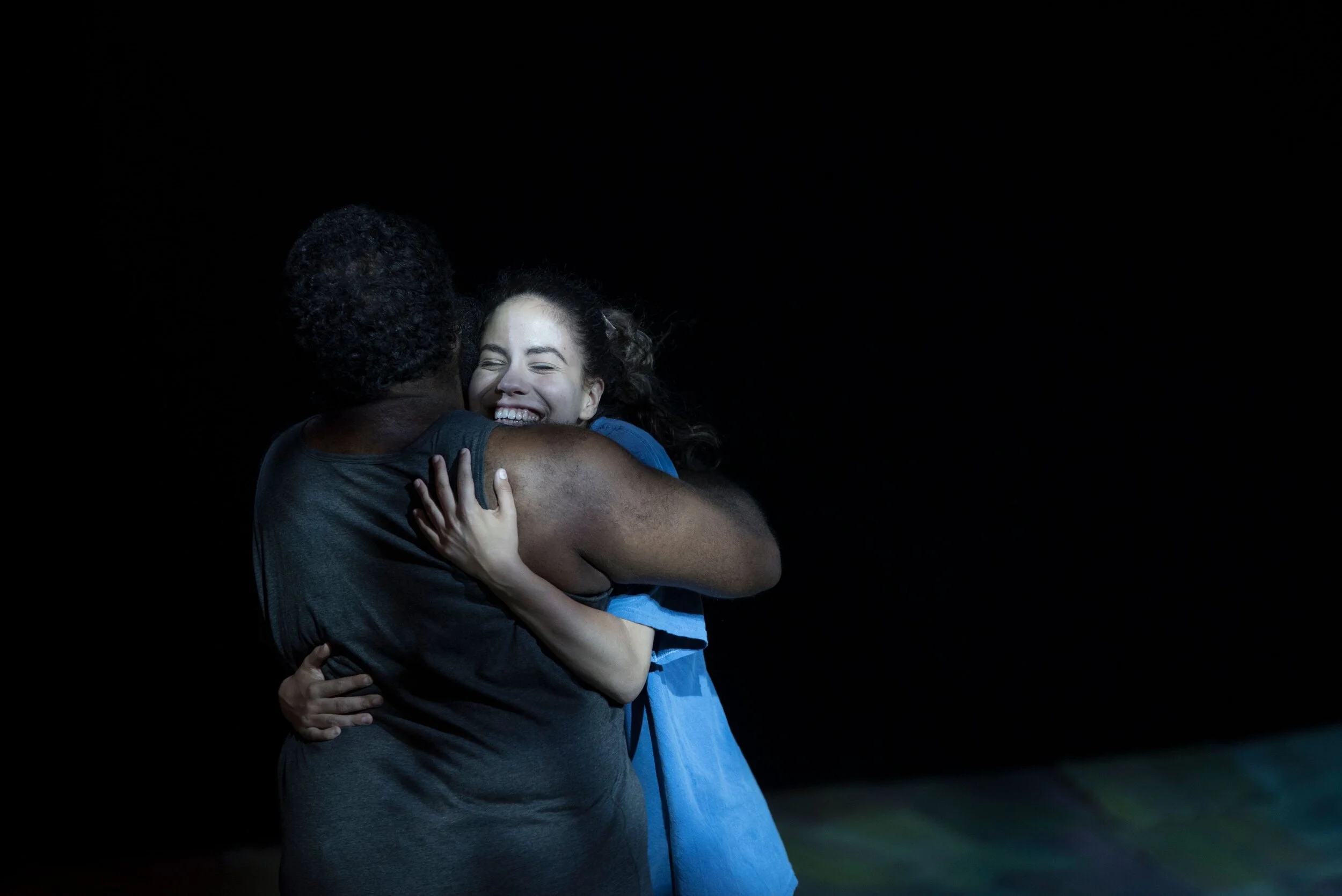INTERVIEW: Cezera Critti-Schnaars Part 1
Cezera Critti-Schnaars is a young Noongar and Greek actor whose passion for acting started when she was very young. Back in February this year at Perth Festival, she starred in Yirra Yaakin Theatre Company’s production of Hecate, a reimagining of Shakespeare’s Macbeth performed entirely in Noongar. In Part 1 of Cezera’s interview, we chatted to her about her high school days, playing Fleance in Hecate, Indigenous identity and the significance of Noongar language.
Photo credit: Dana Weeks.
I don’t know how we started this conversation, but we just fell into talking about your last year of high school and how you wore your nan’s old massive blue dressing gown during the last week. How was high school for you? Did you know that you wanted to get into acting?
It was a wild time. I was quite lucky with the school because not only was it an arts school, most of the teachers were pretty good. Everyone knew I wanted to act, and you know there’s that common thing where teachers at school tell you that’s a shit idea, none of the teachers at my school did that.
What kind of role do teachers and mentors have on the development of young artists?
It such an important role, they have the ability to crush dreams and it’s such a shame when that happens. I mean, I almost failed year 12 drama – that was a whack year, but even then, my drama teacher still didn’t tell me “Don’t go into acting” like it was understood it was a school environment. Everyone has different ways of working and learning. That’s a key thing in the arts, everyone works super differently.
I watched Hecate back in February and really enjoyed it, it was my first Indigenous language based theatre performance that I had seen. Tell us about how it happened.
Wild. Wild. I knew about Hecate since I was 15 because my dad was part of it. I never actually thought I’d be in it. I didn’t even know Fleance was a girl, I had no clue. So I never thought there’d be role for me.
I remember hearing it for the first time back in the end of 2017, when I went in for one of the creative developments. But how I ended up getting in was that I got a text at like 9 o’clock at night from the director, writer and wonderful woman that is Kylie Bracknell, asking if I could come in the next day for a creative development session. I had no idea it was for Hecate. So I went the next day and was like ‘Ohhhhhhh’. I didn’t know a lot of Noongar but I kind of knew how to read it because of Koodarm and Koorlong with Kobi and Della Morrison.
At the end of the week when we got all of the dates, I was really confused because Kylie was talking as though I was in the piece, but I didn’t know if I was, so I just asked if I was, and she basically said “If you’re prepared to work your god damn ass off, then yes, there’s a spot for you”. The first thing I did was call up my dad, and I was like “Dad! I’m a professional actor now!”
Photo credit: Dana Weeks.
It was your first professional theatre project and the play was completely in Noongar, as an emerging actor, how was your experience?
I knew it was going to be an exhausting experience because creative development is a journey and in general a lot but the fact that it was done in a different language was this whole other thing. The thing is, I personally don’t have any baggage with being Indigenous. Let’s be frank, no one ever realises I’m Indigenous, so I don’t tend to get racially discriminated against. People just think I’m ethnic, it is what it is. I thought I would be fine but two days in and there I was crying and wondering what was going on. I think what that week made me realise was that yeah, I personally had no bad experience with being Indigenous but I was still suffering because of the loss of language and loss of culture, and questioning whether or not I was Indigenous enough.
I remember it was Kylie that told me, “I hope you’re not intimidated that your first professional piece is going to be in a different language”. In my head I wasn’t as scared of the language, I was terrified of the fact that I would be working with all of these veterans. I was only 19 when I got it and I panicked. So that was one of the scariest things, the fact that I was going to be working among professionals. It wasn’t until the third week, during a run through with some Perth Festival people that I felt like I belonged there. It took a while to fully settle and to stop that mentality of thinking I’m the worst one here. Having my Dad there was really helpful and great, and I learned so much just watching everyone work. If we are to just talk about some of the females involved, you had Bobbi Henry and Della Rae Morrison, they are just such bloody powerful women. It was so lovely. Everyone helped a lot and taught me, and yeah, I can’t even put into words everything I learned, but I was definitely different by the end of the process.
Being able to know some of my own language, and understanding it a little, being able to understand what was being said to me in a completely different language was a very amazing experience. Everything about that process, as a person and as an artist was a great introduction into the professional world.
Photo credit: Dana Weeks.
Do you think your experience with Hecate helped you with your Indigenous identity? You mentioned before that you were questioning if you were Indigenous enough to be part of the project.
I think it did, I think it helped me get rid of that idea that you have to be a certain way. It helped me get rid of this idea that there’s only one way of being Indigenous. Through Hecate there was connection to language and having the opportunity to speak Noongar. It made me feel more… not comfortable, because I’ve always been comfortable with being Indigenous, but kind of feel less of an imposter. It’s not because I gained a bit of the language, it was more of erasing that idea that there’s only one way to be Indigenous.
What was the significance of having Hecate entirely in Noongar?
I think it was Kylie who said it first, something about how Hecate was simply a vehicle to bring language back to life. Language is tied to culture and culture is tied to language, and I think it was really important in reminding people of its existence. It gave the Elders a chance to hear it again and allowed for others to hear it for the first time. It signified that there’s this whole other language here on this land.
Photo credit: Dana Weeks.
How does Noongar language play a part in the WA arts community?
I think in a sense that it is of here. It’ll probably play an even bigger part further down the line as more people start learning it. I think Hecate was a piece that played a part in kicking it off.
Education is so important. It’s one of the ways you can access the most people, getting to know about Indigenous culture is doable if education makes it an accessible thing. Teaching Indigenous culture is not just boxing up the Stolen Generation and Rabbit Proof Fence, and presenting it as the entirety of Indigenous culture, it is not enough. It would be so much better if it became common place, and I think that is happening with places like Koorlong.
Hecate, a Perth Festival commission, was adapted and directed by Kylie Bracknell and presented by Yirra Yaakin Theatre Company in association with Bell Shakespeare. Part 2 of Cezera’s Young Artists of WA interview is coming out next week on Tuesday 18 August. Follow Cezera on her Instagram.
INTERVIEW BY: YOSHIKA KON





